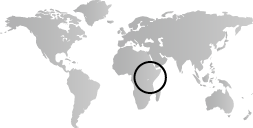By the late nineteenth century, Britain, Germany, and Portugal end Arabic control of the Sudan, Swahili coast, and East African interior. The Horn of Africa similarly falls under European rule when Italy invades the kingdom of Ethiopia in 1935. Traditional forms of art created for ritual and utilitarian purposes, including masks and figures, as well as personal items such as snuff containers are widely collected by museum-sponsored ethnographic expeditions during the first decades of the twentieth century. Western art schools are founded in East Africa, and African artists begin to experiment with newly learned techniques and materials introduced from the West. Artists such as Ibrahim El Salahi of Sudan and Sam Ntiro of Tanzania continue their art education outside of Africa and participate in international creative movements. In British and Portuguese East Africa (later Uganda, Kenya, Tanganyika, and Mozambique), colonial policies of indirect rule encourage the formation of a local African political class educated by African and Western university systems. Young African intellectuals including Julius Nyerere, Jomo Kenyatta, and Eduardo Mondlane emerge as leaders of national liberation movements that achieve independence for their countries. Eastern African artists, who have longstanding traditions of producing art for foreign clients, continue to do so in the twentieth century by developing sculptural genres sold to international consumers. A region rich in architectural and urban history, East Africa is the site of developments in both these fields. Italian modernism, in the form of Art Deco architecture, takes hold in the region of the Horn, while Tanzania builds a new capital based on the tenets of Ujamaa, its national political code.


